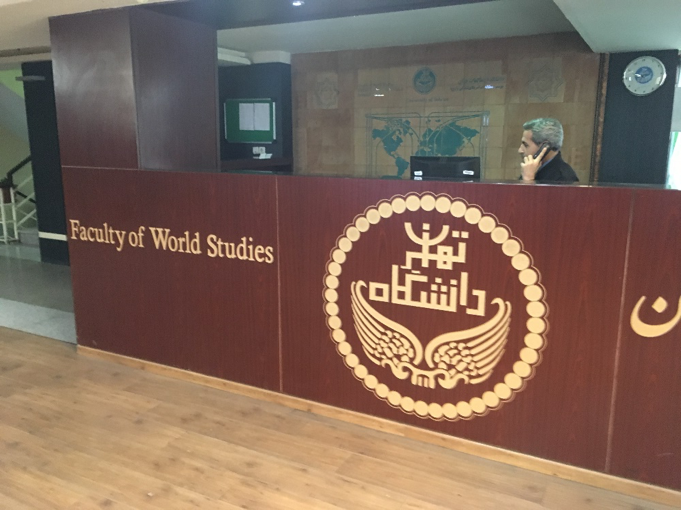Heinz Gärtner visited Teheran and gave lectures at the Institute for Political and International Studies (IPIS), the School of International Studies, and the Faculty of World Studies at the University of Teheran. Below there is a summary of his remarks on the future of the Nuclear Deal (JCPOA) and possible US-Iran talks.
Iran – US Talks?
by Heinz Gärtner
In July 2015, the EU-3 (France, Germany, United Kingdom) plus 3 (United States, China, Russia) negotiated an agreement in Vienna to limit Iran’s nuclear program. In May 2018, U.S. President Trump withdrew the U.S. from the JCPOA—as promised during his election campaign—and signed a presidential memorandum to re-impose all U.S. sanctions lifted or waived in connection with the Iran deal. On November 4, a new wave of sanctions took effect.
Both the U.S. and Iran accuse the other side of striving for hegemony in the Gulf region. On the one hand, the U.S. Nuclear Posture Review (NPR) stresses the hegemonic aspect: “Iran views U.S. influence in the Middle East as the foremost threat to Iran’s goal to establish itself as the dominant regional power.”[i]
On the other hand, Iran sees this strategy as an expansion of U.S. hegemony in the region. In addition to its relatively weak regular armed forces, Iran sees its forward presence in neighboring countries as a second line of deterrence and counter-containment.
In July 2018, President Trump offered to meet Iran’s leaders “anytime they want to” and without preconditions. The leader of the Islamic Revolution Ayatollah Ali Khamenei responded on August 13, 2018. He left the door open for later talks, however: “Currently, negotiation will be definitely harmful to us and is banned”, he said[ii]. The Iranian President Hassan Rouhani did not exclude talks with the U.S. right away and made a suggestion instead. Speaking at the United Nations General Assembly in September 2018, he requested that the U.S. should at least respect UN Security Council resolution 2231 even if it disliked the JCPOA.”[iii]
Iran need not be afraid of such talks since its diplomats proved to be very skillful negotiators. Iran can claim some moral superiority over the US by stressing the principles: no war, no sanctions, no threats, no bullying; just acting according to the law and the fulfillment of obligations. If Iran agreed to such talks, what could be achieved in Iran-U.S. talks? Here are some suggestions:
First, both sides can easily agree on a general declaratory statement. A model for such a declaration could be the document signed by U.S. President Trump and the leader of the DPRK Kim Jong-Un in 2018. It is a very general document on peace and the denuclearization of the whole Korean peninsula. For President Trump, it represented a good start for further steps.
The U.S. and Iran can pledge to renounce hegemonic aspirations in the Gulf region. This may sound too sweeping, but there is a historical analogy: the common declaration (the “Shanghai Declaration”) between U.S. President Nixon and the Chinese leader Mao Zedong in 1972 in which both sides stated that neither they nor any other power should “seek hegemony in the Asia-Pacific region”. This declaration was the basis for the most successful summit meeting during the Cold War. Consequently, China’s support for insurgents in Asia decreased significantly after the meeting.
Moreover, there is another parallel. In the early 1970s, the U.S. sought ways to reduce its presence in Asia and to end the war in Vietnam. Similarly, President Trump announced several times that he wants to decrease U.S. presence abroad. Among Iranians, there is some discontent about the resources their government spends in other countries like Lebanon, Syria, Yemen, Iraq, and for the support of the Palestinians. Such an agreement could give Iran some cover to decrease these expenses.
A common declaration of the U.S. and Iran could include the confirmation of the preamble of the JCPOA that the member states “ensure that Iran’s nuclear program will be exclusively peaceful” and that “Iran reaffirms that under no circumstances” it will “ever seek, develop or acquire any nuclear weapons”. In addition, the JCPOA is based on international law with the reference of the Resolution of the United Nations Security Council 2231. Iran should at the same time adhere in the JCPOA together with the European signatories, China and Russia.
Second, Iran can suggest regional arms control negotiations that address the missile issue outside the JCPOA in accordance with Secretary of State Mike Pompeo's request in May 2018[iv]. It should include the other regional powers, probably with the exception of Israel, but with the inclusion of Saudi Arabia’s weapons program whose missiles already have a longer range than those of Iran. Other heavy weapons could be included as well. A model could be the CFE-Treaty on the conventional forces in Europe of 1990. It covers tanks, artillery, armored combat vehicles, combat aircraft and attack helicopters. This talks could well take place within the framework of the “Regional Dialogue Forum” and the new security networks suggested by Iran’s Foreign Minister Mohammad Javad Zarif.
A long term Iranian and U.S. troop presence increases the risk of military conflict. There has to be a way out of the current stalemate.
[i]Nuclear Posture Review 2018, U.S. Department of Defense
[ii]‘No negotiation with current U.S. administration, Ayatollah Khamenei says’ (13 August 2018). Tehran Times
[iii]Iranian President Rouhani Speaks at U.N. General Assembly (25 September 2018). C-SPAN
[iv]Mike Pompeo, After the Deal: A New Iran Strategy (21 May 2018) U.S. Department of State

